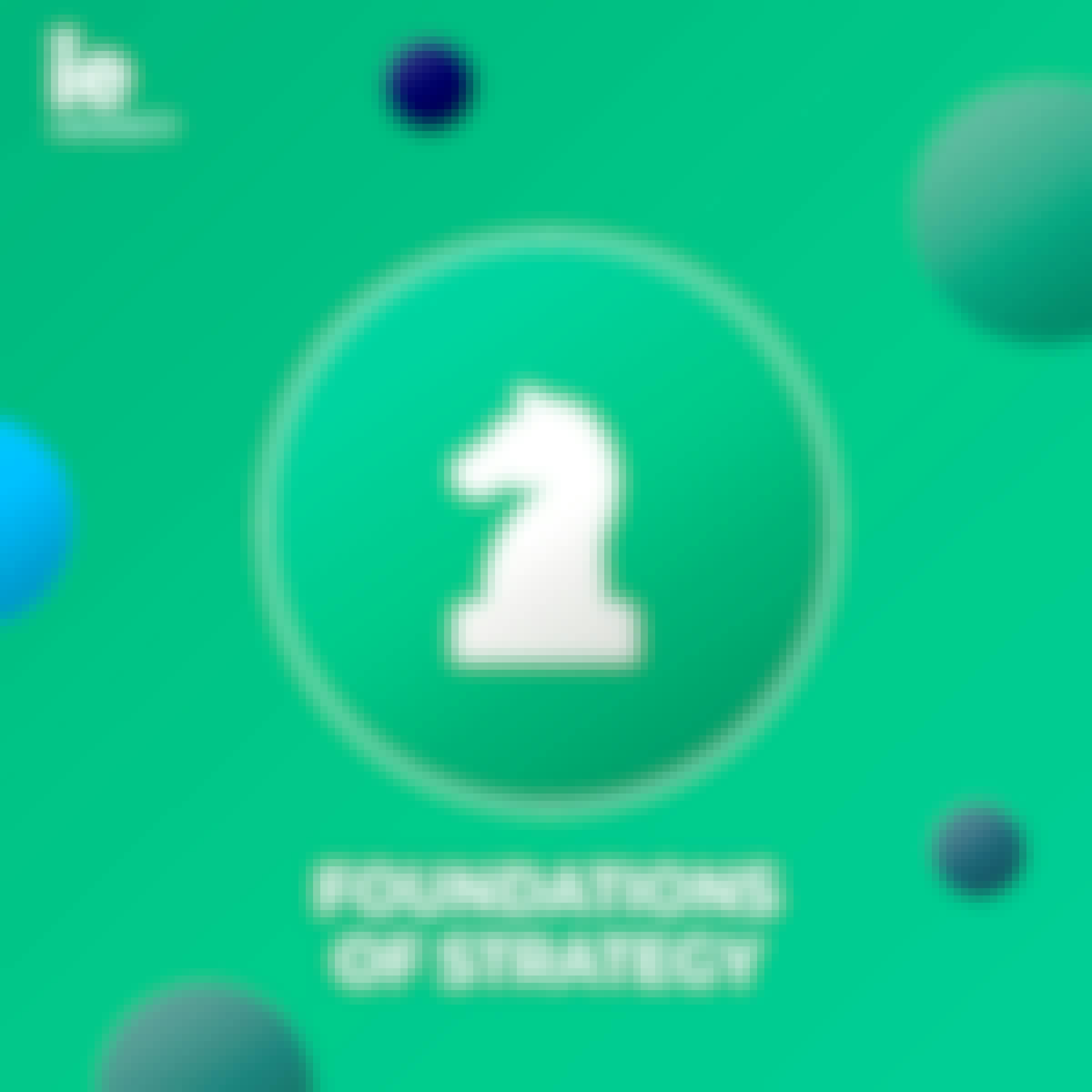- Browse
- Strategic Planning
Strategic Planning Courses Online
Learn strategic planning for organizational growth. Understand how to set goals, allocate resources, and measure performance.
Explore the Strategic Planning Course Catalog
 Status: Free TrialFree TrialU
Status: Free TrialFree TrialUUniversity of California, Irvine
Skills you'll gain: Business Strategy, Organizational Leadership, Business Planning, Accountability, Business Management, Leadership and Management, Management Training And Development, Team Leadership, Business Leadership, Strategic Planning, Business, Competitive Analysis, Strategic Thinking, Corporate Strategy, Leadership Development, Business Administration, Strategic Leadership, Organizational Strategy, Employee Coaching, People Development
4.7·Rating, 4.7 out of 5 stars390 reviewsBeginner · Course · 1 - 4 Weeks
 Status: PreviewPreviewE
Status: PreviewPreviewEEDHEC Business School
Skills you'll gain: Systems Thinking, Strategic Thinking, Forecasting, Strategic Planning, Strategic Decision-Making, Stakeholder Engagement, Organizational Strategy, Complex Problem Solving, Business Transformation, Business Strategy, Trend Analysis, Innovation, Sustainable Development, Decision Making, Creativity, Emerging Technologies
4.9·Rating, 4.9 out of 5 stars246 reviewsIntermediate · Course · 1 - 3 Months
 Status: Free TrialFree TrialA
Status: Free TrialFree TrialAArizona State University
Skills you'll gain: Strategic Thinking, Visionary, Research, Influencing, Strategic Decision-Making, Data Collection, Systems Thinking, Strategic Planning, Proactivity, Negotiation, Business Strategy, Complex Problem Solving, Communication Strategies, Surveys, Creative Thinking, Scientific Methods, Decision Making, Recognizing Others, Cognitive flexibility, Research Methodologies
4.5·Rating, 4.5 out of 5 stars113 reviewsBeginner · Specialization · 3 - 6 Months
 Status: Free TrialFree TrialC
Status: Free TrialFree TrialCCopenhagen Business School
Skills you'll gain: Business Strategy, Business Planning, Case Studies, Strategic Decision-Making, Strategic Thinking, Plan Execution, Goal Setting, Resource Management, Organizational Strategy, Peer Review, Competitive Analysis, Strategic Leadership, Innovation, Organizational Structure, Strategic Planning, Market Analysis, Culture Transformation, Change Management, Business Strategies, Business Management
4.7·Rating, 4.7 out of 5 stars5.2K reviewsBeginner · Specialization · 3 - 6 Months
 Status: Free TrialFree TrialA
Status: Free TrialFree TrialAArizona State University
Skills you'll gain: Strategic Thinking, Strategic Decision-Making, Systems Thinking, Strategic Planning, Business Strategy, Complex Problem Solving, Decision Making, Contingency Planning, Analysis, Trend Analysis, Case Studies, Strategic Prioritization, Competitive Analysis, Data-Driven Decision-Making, Market Intelligence, Performance Analysis
4.5·Rating, 4.5 out of 5 stars71 reviewsMixed · Course · 1 - 3 Months
 Status: Free TrialFree TrialJ
Status: Free TrialFree TrialJJohns Hopkins University
Skills you'll gain: Strategic Leadership, Strategic Planning, Leadership, Business Planning, Organizational Change, Business Strategy, Organizational Strategy, Planning, Strategic Decision-Making, Collaboration, Organizational Leadership, Change Management, Relationship Building, Influencing
4.9·Rating, 4.9 out of 5 stars14 reviewsIntermediate · Course · 1 - 4 Weeks
What brings you to Coursera today?
 Status: PreviewPreviewI
Status: PreviewPreviewIIE Business School
Skills you'll gain: Competitive Analysis, Business Strategy, Economics, Market Dynamics, Business Economics, Strategic Thinking, Market Analysis, Strategic Planning, Strategic Marketing, Resource Management, Business Process
4.8·Rating, 4.8 out of 5 stars205 reviewsBeginner · Course · 1 - 4 Weeks
 Status: FreeFree
Status: FreeFreeSkills you'll gain: Cash Flow Forecasting, Financial Forecasting, Cash Flows, Financial Analysis, Business Planning, Financial Statements, Entrepreneurship, Financial Planning, Financial Management, Business Strategy, Strategic Decision-Making, Strategic Planning
4.7·Rating, 4.7 out of 5 stars484 reviewsMixed · Course · 1 - 4 Weeks
 C
CCoursera
Skills you'll gain: Employee Onboarding, Relationship Building, Strategic Planning, Planning, Team Oriented, Goal Setting, Expectation Management, Conscientiousness, Professionalism, Adaptability, Communication, Business Writing
4.6·Rating, 4.6 out of 5 stars59 reviewsBeginner · Guided Project · Less Than 2 Hours
 Status: NewNewStatus: Free TrialFree TrialU
Status: NewNewStatus: Free TrialFree TrialUUniversity of Huddersfield
Skills you'll gain: Stakeholder Management, Business Strategy, Strategic Planning, Organizational Strategy, Innovation, Stakeholder Analysis, Strategic Leadership, Strategic Thinking, Organizational Change, Strategic Decision-Making, Business Transformation, Business Planning, Case Studies, Business Leadership, Change Management, Growth Strategies, Strategic Prioritization, Strategic Communication, Business Priorities, Critical Thinking and Problem Solving
Beginner · Specialization · 1 - 3 Months
 Status: NewNewStatus: Free TrialFree Trial
Status: NewNewStatus: Free TrialFree TrialSkills you'll gain: Strategic Decision-Making, Corporate Strategy, Business Strategies, Business Strategy, Business Ethics, Organizational Strategy, Strategic Leadership, Business Planning, Growth Strategies, Environmental Social And Corporate Governance (ESG), Strategic Prioritization, Strategic Planning, Strategic Thinking, Management Information Systems, Stakeholder Management, Business Administration, Plan Execution, Operational Efficiency, Business, Business Process Reengineering
Beginner · Specialization · 3 - 6 Months
 Status: NewNewStatus: Free TrialFree Trial
Status: NewNewStatus: Free TrialFree TrialSkills you'll gain: Strategic Decision-Making, Corporate Strategy, Business Strategies, Business Strategy, Business Ethics, Strategic Planning, Growth Strategies, Strategic Thinking, Organizational Strategy, Environmental Social And Corporate Governance (ESG), Strategic Prioritization, Business Planning, Operational Efficiency, Business Process Reengineering, Organizational Effectiveness, Operational Analysis, Corporate Sustainability, Competitive Analysis, Market Share, Portfolio Management
Mixed · Course · 1 - 4 Weeks
Strategic Planning learners also search
In summary, here are 10 of our most popular strategic planning courses
- Essentials of Management and Strategic Planning: University of California, Irvine
- Building Strategic Foresight Capabilities: EDHEC Business School
- Strategic Thinking for Everyone: Arizona State University
- Strategic Management and Innovation: Copenhagen Business School
- Strategic Thinking: Arizona State University
- Leadership in Action and Planning: Johns Hopkins University
- Foundations of Strategy: IE Business School
- Fundamentals of Financial Planning, with Goldman Sachs 10,000 Women: Goldman Sachs
- Assimilating into Your New Job: Coursera
- Strategic Management Essentials: University of Huddersfield
Frequently Asked Questions about Strategic Planning
Strategic planning is the process by which an organization sets its goals, defines its path for achieving them, and allocates required resources accordingly. This process of creating a business strategy is important because it establishes agreement around the common goals of an enterprise and provides a shared framework for evaluating progress. Thus, beyond simply helping to guide the annual budget, strategic planning is an important leadership and management tool.
The strategic planning process can be broken down in a variety of ways, but generally has three phases: strategic analysis, strategy formulation, and strategy implementation. The analysis phase requires a capabilities analysis of the business as well as consideration of its competitive position within the industry structure it operates in. Formulation takes these insights as a basis for setting achievable goals and deciding on appropriate courses of action to achieve them.
Of course, the most challenging phase of strategic planning is implementation. As any manager knows, even the most careful planning process can never anticipate all the complexities the future holds - particularly considering the rapid changes occurring in our world today. Strategic management means knowing how to adapt to changing circumstances as the business moves forward while continuing to rely upon the goals set in the strategic planning process for guidance.
Every manager in an organization must understand strategic planning, as this process is typically central to setting annual budgets and reporting for each department. Thus, Human resources (HR) managers, sales and marketing managers, financial managers, and other department heads need to be able to provide useful inputs into the planning process as well as participate in its ongoing implementation.
Strategic planning skills are especially important for top-level executives, such as chief executive officers (CEOs), chief operating officers (COOs), chief financial officers (CFOs), and other “C-suite” positions in a company. These executives are responsible for devising the overarching strategy for the company, establishing the policies required to meet them, and ensuring that managers understand and follow through on their implementation. According to the Bureau of Labor Statistics, chief executives earned a median salary of $184,460 in May 2019, making this a very highly compensated skill set.
Yes. Coursera offers a wide range of business courses as well as Specializations online, including opportunities to learn about strategic planning specifically from top-ranked schools like the University of Virginia and Copenhagen Business School. You can even learn about this skill as part of Coursera’s full-fledged online MBA programs offered by schools like the University of Illinois at Urbana Champaign and Macquarie University.
Regardless of what your career goals are, or the educational strategy you’re pursuing to achieve them, Coursera lets you learn online on a flexible schedule. Thus, you can learn about strategic planning while continuing to work at your existing job, making this an excellent choice for mid-career professionals as well as business-minded students that want a high-level skill set as they begin their career.
The skills and experience that you might need to already have before starting to learn strategic planning may include experience with organizational management work, assessing company practices and methods, and helping executives to make decisions that could help them guide their organizations in more focused ways. In much the same way that a financial planner helps people understand their investments and how to make the most of their return, strategic planners can help companies set corporate priorities, focus the company’s energy and resources into potentially high ROI activities, and help to strengthen overall operations. Being able to have these skills and experience before learning strategic planning may make you a valuable asset to a team.
The kind of people that are best suited for work that involves strategic planning are those people who display good analytical characteristics for business vision, have leadership confidence, are strong with data and numbers, are computer literate, and can communicate well. People in strategic planning roles usually work in analyzing and assessing business environments to come up with a strategic formulation to organize business units. To do this high-level work, they often are smart, detail-oriented, have agreeable personalities, and can get the job done. These people may also have a bachelor's or master’s degree in accounting, business, finance, or economics.
You might know if learning strategic planning is right for you if you have enthusiasm for directing the level of change in a group, a team, a business, or a corporate organization. Learning about strategic planning can take on many facets, from understanding the basics of a more human resources focus for employee changes to a more technology-based focus for a company-wide change to digital transformation methods. Learning strategic planning can be a strong stepping stone to staying abreast of changes in business processes and practices. Strategic planning is a large field of opportunity for a creative, detail-focused, innovative individual to take, and if this is interesting to you, you may find this to be a rewarding new career path.
Online Strategic Planning courses offer a convenient and flexible way to enhance your knowledge or learn new Strategic Planning skills. Choose from a wide range of Strategic Planning courses offered by top universities and industry leaders tailored to various skill levels.
When looking to enhance your workforce's skills in Strategic Planning, it's crucial to select a course that aligns with their current abilities and learning objectives. Our Skills Dashboard is an invaluable tool for identifying skill gaps and choosing the most appropriate course for effective upskilling. For a comprehensive understanding of how our courses can benefit your employees, explore the enterprise solutions we offer. Discover more about our tailored programs at Coursera for Business here.










